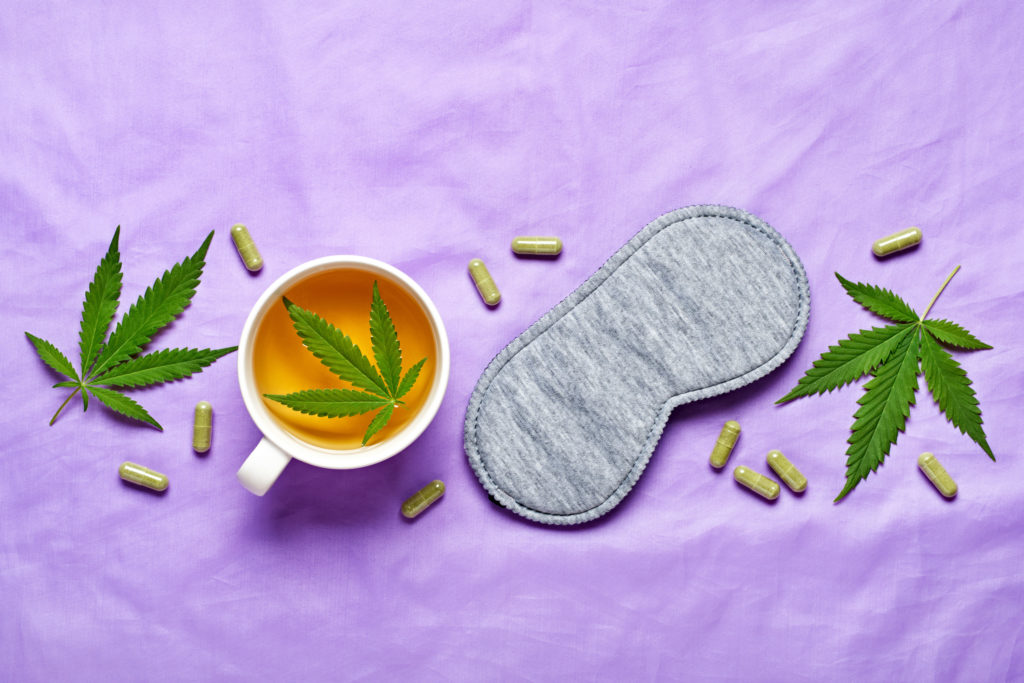
Imagine taking a gummy or just a few drops of a tincture and having your racing thoughts melt away as you’re lulled into a deep, peaceful slumber. For the 50 million and counting Americans who suffer from sleep disorders, such a solution sounds like it could only exist in a dream.
Yet, it’s the reality we live in today. Cannabidiol (CBD) is a non-psychoactive cannabinoid that may help you catch a few extra winks at night. And taking CBD is truly as simple as enjoying a gummy before bed or taking a few drops from a tincture under your tongue.
How CBD Can Help You Sleep Better at Night
“The [sleep-inducing] effects of cannabinoid drugs have long been known,” a Frontiers in Molecular Neuroscience study begins. “And there has been considerable recent interest in the use of cannabis Sativa derivatives and other cannabinoid compounds as sleep aids.”
Throughout the study, the authors describe how research over the years has demonstrated that cannabis can help you fall asleep faster and stay asleep through the night.
Additionally, cannabis increases the duration of slow-wave sleep and decreases REM sleep. This means your body would spend less time dreaming and more time in other sleep cycles. For context, there are four non-REM stages of sleep, and one stage of REM sleep. Dreaming primarily occurs during REM sleep.
The endocannabinoid system also appears to regulate your circadian rhythm. Studies that have measured endocannabinoid levels throughout the day found anandamide is highest during waking hours and lowest just before falling asleep.
Related Reading: Endocannabinoids v.s. Phytocannabinoids
Thus it makes sense how substances that affect the endocannabinoid system — i.e., THC — would also affect sleep.
While many of these previous sleep trials were conducted using THC, there has been a surge in scientific research around how CBD can improve your sleep quality and duration, too. CBD is also more accessible than THC, as hemp-derived CBD products are federally legal and widely available throughout the United States.
According to a review in the Current Psychiatry Reports journal, CBD seems to have dose-dependent effects on sleep. In other words, low doses of CBD may increase wakefulness, while higher doses of CBD are associated with sedation.
One of the studies cited in the review found participants who took 160mg of CBD daily slept longer per night. They also reported fewer sleep disturbances.
In both animal and human models of anxiety-induced insomnia, CBD has been shown to reduce anxiety and improve sleep quality, the review explains.
Additional studies on sleep, anxiety, and CBD demonstrate improvements in symptoms that were “sustained over time,” a study in The Permanente Journal reports.
CBD For Pain Relief and Sleep
In addition to anxiety, chronic pain is a major contributor to insomnia and sleep disturbances. In fact, those with chronic pain are 18 times more likely to be diagnosed with insomnia. Furthermore, chronic pain can greatly contribute to increased anxiety.
CBD’s anti-inflammatory and analgesic (pain-relieving) properties can reduce pain locally by applying it as a topical cream. On the other hand, taking CBD orally or vaporizing hemp flower can alleviate pain systematically throughout your body.
Studies on CBD and chronic pain have shown significant decreases in symptoms, making it a promising natural alternative for potential pain and insomnia relief.
CBD and Melatonin
Melatonin is a hormone your body produces to regulate your sleep-wake cycle. Simply put, melatonin is your brain’s way of telling the rest of your body it’s time to sleep.
Recently, over-the-counter melatonin supplements have caught on in popularity as a holistic way to remedy sleep difficulties. Usually sold in the form of a tablet, capsule, or gummy, melatonin can make you feel drowsy within 20 minutes to two hours of taking it.
The CBD industry is no stranger to the rising popularity of melatonin, either. Several major CBD companies have started selling products that contain both compounds to market them as a sleep aid.
Now, studies are looking into the efficacy of these CBD + melatonin products. In a study of 20 individuals with anxiety, pain, and “poor sleep,” the participants took CBD and melatonin over a three-month period. During the study, the participants reported:
- Reductions in chronic pain induced by laying on certain joints or involuntary movements during sleep.
- Reductions in bladder hyperactivity and non-IBD-related “disturbing bowel movements.”
- Reductions in anxiety and nightmares.
- Reductions in involuntary movements during sleep and other abnormalities (i.e. sleep talking).
The researchers of this study conclude the efficacy of CBD and melatonin could be competitive with traditional sleep medications.
CBD Gummies for Sleep

There’s an incredibly diverse selection of products on the CBD market. When shopping for CBD, you have the option to purchase it as a gummy, a tincture oil, a vape oil, or as hemp flower. Topical CBD products are great for pain relief, but they won’t affect your sleep.
CBD gummies are easy to dose and take each night. However, it can take 30 to 90 minutes for the effects to kick in. Therefore, you should take CBD gummies about an hour before you intend to go to bed. That way, you’ll be nice and relaxed by the time you’re ready to sleep.
Tinctures are another viable option if you have trouble chewing or swallowing. Simply place a few drops under your tongue and wait 30 seconds before swallowing the oil. It should take about 15 to 90 minutes for you to feel the effects of the CBD tincture.
Vaping or smoking CBD is the fastest way to take it, as you’ll feel the effects of CBD almost instantly after inhaling it.
CBN Gummies and Tinctures
CBD and THC aren’t the only cannabinoids with sleep-promoting effects, either. Over the last few years, cannabinol (CBN) has skyrocketed in popularity for its sedating effects.
Like CBD, you can take hemp-derived CBN in the form of a gummy or a tincture. Again, you should make sure to take your CBN at least an hour before you plan on going to bed.
Key Takeaways: CBD Could Improve Your Sleep

CBD is a non-psychoactive cannabinoid with anxiety-reducing, pain-relieving, and anti-inflammatory properties. While studies on cannabis and sleep have been conducted since the 1970s, research has recently shifted toward looking at how CBD specifically affects sleep.
In short, here are the key takeaways on how CBD could affect your sleep:
- CBD has dose-dependent effects on sleep. Larger doses of CBD are associated with drowsiness, while smaller doses of CBD are associated with wakefulness.
- CBD can improve your sleep by alleviating anxiety and stress.
- CBD has anti-inflammatory and analgesic effects that could reduce the chronic pain that’s keeping you up at night.
- CBD and melatonin products are relatively new. However, research thus far seems to support their efficacy as a sleep aid.
- Gummies and tinctures are an easy and effective way to take CBD before bed.
- Other cannabinoids, including CBN, may also improve your quality of sleep.
To learn more about the science behind cannabis as a sleep aid, listen to the “Cannabis & Insomnia with Dr. Oludare Odumosu” episode of the Cannabis Science Today podcast. In this episode, host Emily Fata interviews biochemist Dr. Odumosu about his research on cannabis and insomnia.
References
- American Sleep Association. (2021, May 26). Sleep Statistics: Data About Sleep Disorders. https://www.sleepassociation.org/about-sleep/sleep-statistics/
- Think About Cannabis. (2022, February 16). The Science & Mystery Behind CBD. https://thinkaboutcannabis.com/cannabis-science/the-science-mystery-behind-cbd
- Kesner, A. J., & Lovinger, D. M. (2020). Cannabinoids, Endocannabinoids and Sleep. Frontiers in Molecular Neuroscience, 13. https://doi.org/10.3389/fnmol.2020.00125
- Think About Cannabis. (2022, March 4). Endocannabinoids vs. Phytocannabinoids. https://thinkaboutcannabis.com/cannabis-science/endocannabinoids-vs-phytocannabinoids
- Babson, K. A., Sottile, J., & Morabito, D. (2017). Cannabis, Cannabinoids, and Sleep: a Review of the Literature. Current Psychiatry Reports, 19(4). https://doi.org/10.1007/s11920-017-0775-9
- Shannon, S., Lewis, N., Lee, H., & Hughes, S. (2019). Cannabidiol in Anxiety and Sleep: A Large Case Series. The Permanente Journal, 23. https://doi.org/10.7812/tpp/18-041
- Whibley, D., AlKandari, N., Kristensen, K., Barnish, M., Rzewuska, M., Druce, K. L., & Tang, N. K. (2019). Sleep and Pain. The Clinical Journal of Pain, 35(6), 544–558. https://doi.org/10.1097/ajp.0000000000000697
- Urits, I., Gress, K., Charipova, K., Habib, K., Lee, D., Lee, C., Jung, J. W., Kassem, H., Cornett, E., Paladini, A., Varrassi, G., Kaye, A. D., & Viswanath, O. (2020). Use of cannabidiol (CBD) for the treatment of chronic pain. Best Practice & Research Clinical Anaesthesiology, 34(3), 463–477. https://doi.org/10.1016/j.bpa.2020.06.004
- Palmieri, G., Vadalà, M., Corazzari, V., & Palmieri, B. (2022). Insomnia treatment: a new multitasking natural compound based on melatonin and cannabis extracts. Clinical Therapeutics. https://doi.org/10.7417/ct.2022.2399